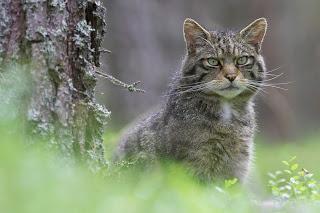
Pete Cairns - The Big Picture
DNA collection and genetic analysis of wild Scottish wildcats is taking place this winter to help guide current and future conservation efforts for this endangered Scottish species.Scottish Wildcat Action (SWA) and the Royal Zoological Society for Scotland (RZSS) will take part in a short period of wildcat trapping over two months in three of the project’s five priority areas.The focus of this work is on targeted trapping of wildcats for DNA sampling. All cats trapped and sampled will have full disease screening, pelage scoring and genetic testing.In addition to the sampling, a number of cats will be fitted with GPS radio tracking collars that will allow researchers to gain a better understanding of how wildcats and feral cats coexist and how this relates to hybridisation.These procedures will be carried one animal at a time so as to minimise disruption to the animal’s normal routine.SWA is open and transparent about its work and all studies undertaken will be fully documented and available.Roo Campbell, the SWA project manager, said: “We are at the stage of the project at which we need firm genetic information on all wildcats left to inform current and future conservation decisions. This information will also give us a clearer view on where population recovery techniques, such as reintroduction, could take place”.“Trapping will allow us to collect samples for DNA and disease screening. The cat will be released immediately."Dr Kerry Kilshaw from Oxford University is running further research into wildcats and their behavior by putting temporary GPS radio tracking collars on wildcats and hybrids to track their movements.“This information will help us hugely in enabling us to protect them in the future by better understanding their home ranges, den sites and how they use the landscape. It will also allow us to monitor the individuals, using live data of where each wildcat is.”
